
Many hotel brands tend toward uniformity. But Populus stands apart. The carbon-positive collection from developer Urban Villages is neither defined by a single design style nor tethered to a formulaic guest experience. Instead, each Populus hotel is built as a reflection of its city, rooted in local culture, inspired by its natural surroundings, and grounded in a radical commitment to environmental stewardship.
The result: properties as different as Seattle’s forest-infused landmark in Pioneer Square and Denver’s aspen-inspired, new-build downtown. One leans into adaptive reuse, layering greenery and art into a century-old structure. The other is an architectural statement piece, designed from the ground up to reforest as much as it hosts. Together, they embody an ethos that redefines what modern hospitality can be: regenerative, community-minded, and deeply connected to place.
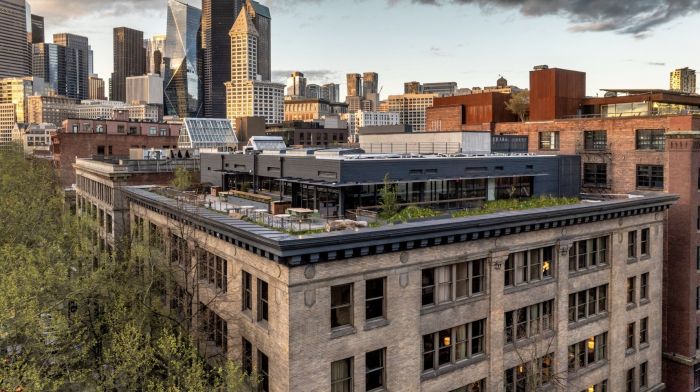
A Brand Built on Carbon Positivity
Populus is the first carbon-positive hotel brand in the United States, a distinction that’s not a marketing ploy but a core operating principle. Every project begins with a lifecycle assessment that considers embodied and operational carbon, from construction materials to daily energy use. Instead of simply reducing impact, Populus goes further, offsetting more carbon than it produces through reforestation and soil sequestration projects. Its signature One Night, One Tree initiative plants a tree for every night booked—meaning a guest’s stay has a direct, measurable impact on the environment. That commitment plays out differently in Seattle and Denver, but the philosophy is consistent: sustainability is not an amenity, it’s the foundation.
Populus Seattle: History and Forest Brought Indoors
If Denver’s Populus looks toward the future, Seattle’s gazes both backward and forward. Opened in Pioneer Square, the city’s first neighborhood, Populus Seattle occupies the restored Westland Building, a 1907 landmark that has seen timber booms, Great Fires, and waves of reinvention.
Adaptive reuse became the project’s north star. By preserving Douglas fir beams, exposed brick, and original car decking rather than building anew, the team cut the hotel’s embodied carbon by more than a third. At the same time, long-covered skylights were reopened, channeling daylight through the structure in a way that reconnects the building to the outdoors. Inside, Chicago-based Curioso Design brought the Pacific Northwest rainforest to life in layered, tactile ways. A soaring moss wall climbs toward a glass roof. Tropical plants spill over a lobby staircase. The Salt Harvest Solarium envelops diners in light-dappled greenery. Even the artwork becomes ecosystem: G(host) Forest, a monumental installation made of fallen trees and living plants, hovers in the entryway like a suspended woodland.
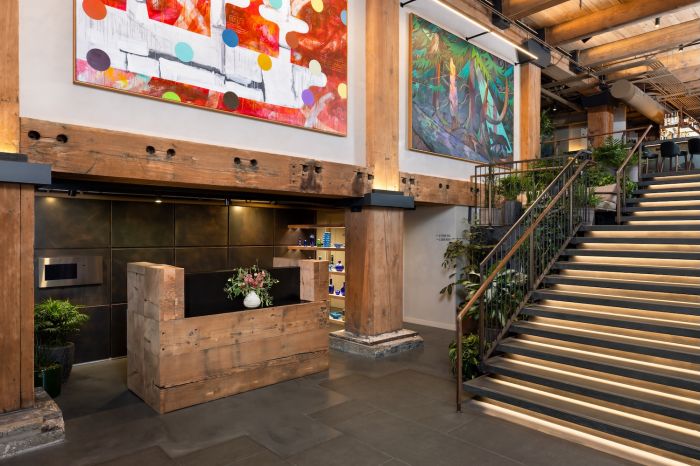
Art anchors the hotel as much as architecture. More than 300 works, curated with ARTXIV, include pieces by Northwest voices such as Sean Barton and Andrea Heimer alongside international names. Guest rooms continue the theme, with exposed brick, oversized windows, and natural materials framing interiors named after regional flora. Each guest room door is hand-painted with a unique botanical illustration, reinforcing the sense of staying in a living forest.
Culinary identity is equally grounded in place. Salt Harvest, led by chefs with pedigrees from Eleven Madison Park and The French Laundry, puts local seafood, produce, and meats at the forefront, many cooked over a wood-fired hearth. Upstairs, Firn, the neighborhood’s first rooftop bar, draws its name from glacial ice, with cocktails categorized by ice type and a menu focused on preservation techniques like curing and fermenting.
And while the hotel could easily serve as an enclave, it was designed instead as a civic hub. It connects directly to RailSpur, Urban Villages’ emerging micro-district of reimagined alleyways, culinary concepts, and art spaces. The effect is less hotel-as-bubble, more hotel-as-neighborhood catalyst.
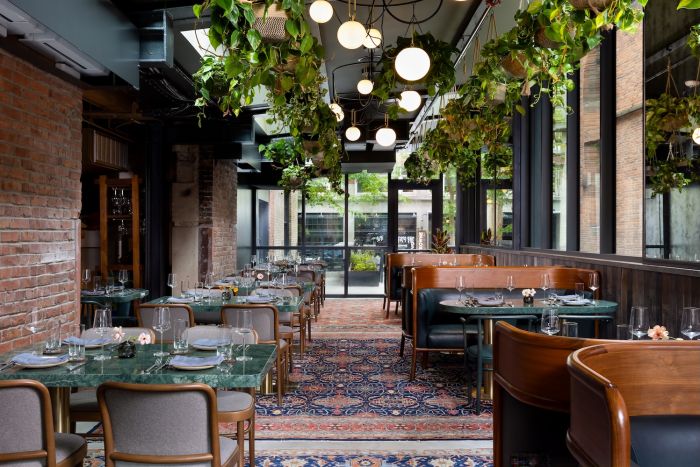
Populus Denver: The Aspen Tree Reimagined
Where Seattle layers history with greenery, Denver begins with a bold architectural gesture. Designed by Jeanne Gang’s Studio Gang, the city’s Populus hotel is immediately recognizable by its façade of “Aspen eyes.” Inspired by the oval scars left when aspen trees shed branches, the scalloped white exterior seems alive, watching the city with quiet animation. That nod to nature is more than symbolic. The 265-room property is the nation’s first carbon-positive hotel, built with low-carbon concrete, locally sourced beetle-kill pine, reclaimed snow fencing, and mycelium-based finishes. There’s no underground parking garage—an unusual omission for Denver—because avoiding reinforced concrete significantly reduces embodied carbon. Instead, the design encourages cycling, walking, and public transit.
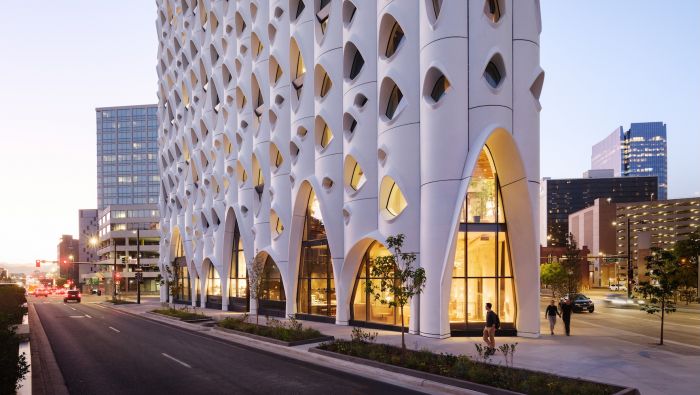
Inside, Wildman Chalmers Design carried the aspen grove metaphor through every level. The lobby channels the “forest floor” with warm, earthy tones and a reception desk carved from a cottonwood log. Guest rooms evoke the “trunk,” with lighter palettes and oversized Aspen-eye windows that double as seating alcoves or cushioned hammocks. The rooftop “canopy” bursts with saturated greens, charred woods, and a terrace planted with pollinator-friendly species, attracting bees and butterflies as much as hotel guests.
Art curated by Colorado artist Katherine Homes reinforces the regional story: pressed wildflowers in rooms, commissioned works from Indigenous artists, even soundscapes of Rocky Mountain bird calls playing in the elevators.
Culinary programming embraces the same ecological rigor. On the ground floor, Pasque serves seasonal Mountain West cuisine beneath the sweeping Aspen-eye windows. Above, Stellar Jay turns the rooftop into a lively canopy of wood-fired cooking, lime-washed ceilings, and Capitol-dome views. Little Owl Coffee, a Denver favorite, connects the hotel to the neighborhood with espresso, pastries, and all-day foot traffic. Every outlet operates with a zero-waste philosophy, with food scraps cycled into compost for local farms.
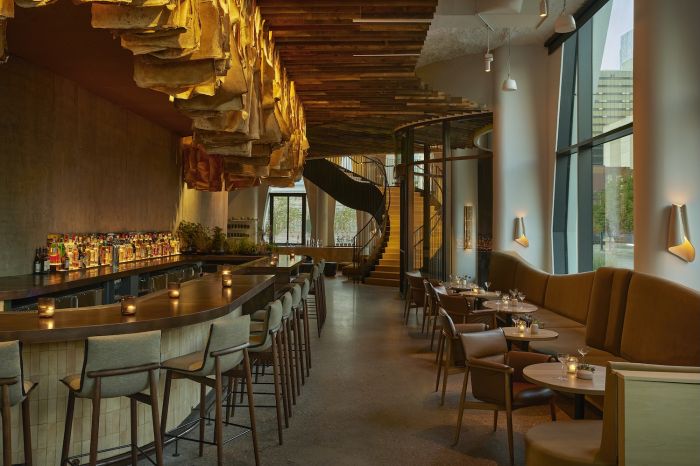
A Shared Ethos, Distinct Identities
Comparing Seattle and Denver underscores what makes Populus unique as a brand. Both properties are unapologetically tied to their locales: Seattle through its adaptive reuse and rainforest design language, Denver through its aspen-inspired architecture and mountain-rooted materials. Both approach sustainability not as an afterthought but as the organizing principle of the project. And yet, the experiences are distinctly different. Seattle feels like a forest grown inside a century-old landmark. Denver feels like a sculptural grove rising from the city grid. One is layered with history, the other boldly contemporary. Together, they illustrate how a brand can be cohesive without being cookie-cutter, consistent in mission while flexible in expression.
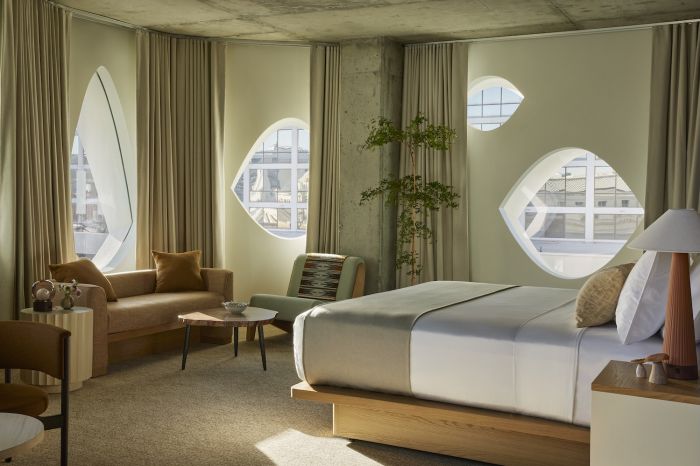
A New Model of Hospitality
The traditional luxury hotel playbook relies on opulence, convenience, and escapism. Populus reframes the equation. Its proposition is not “less guilt” but “more good:” a stay that actively benefits the environment while embedding travelers more deeply in the character of a place. Guests will notice the beauty first—the moss walls, the Aspen-eye windows, the rooftop cocktails. What they’ll feel, more subtly, is the brand’s ambition: to make hospitality regenerative, to create hotels that serve their cities, and to prove that sustainability and luxury are not opposites but natural allies.
In Denver and Seattle, Populus has already planted the seeds. The forests that rise because of them, both literal and figurative, are only beginning to grow.
Photos courtesy of Populus Hotels









